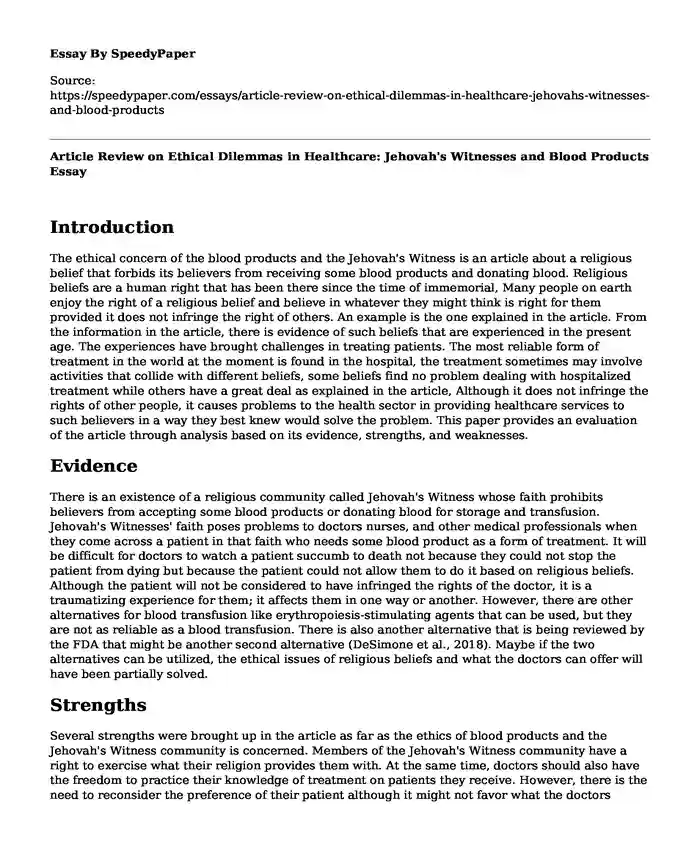
| Essay type: | Critical analysis essays |
| Categories: | Health and Social Care Ethical dilemma |
| Pages: | 3 |
| Wordcount: | 823 words |
Introduction
The ethical concern of the blood products and the Jehovah's Witness is an article about a religious belief that forbids its believers from receiving some blood products and donating blood. Religious beliefs are a human right that has been there since the time of immemorial, Many people on earth enjoy the right of a religious belief and believe in whatever they might think is right for them provided it does not infringe the right of others. An example is the one explained in the article. From the information in the article, there is evidence of such beliefs that are experienced in the present age. The experiences have brought challenges in treating patients. The most reliable form of treatment in the world at the moment is found in the hospital, the treatment sometimes may involve activities that collide with different beliefs, some beliefs find no problem dealing with hospitalized treatment while others have a great deal as explained in the article, Although it does not infringe the rights of other people, it causes problems to the health sector in providing healthcare services to such believers in a way they best knew would solve the problem. This paper provides an evaluation of the article through analysis based on its evidence, strengths, and weaknesses.
Evidence
There is an existence of a religious community called Jehovah's Witness whose faith prohibits believers from accepting some blood products or donating blood for storage and transfusion. Jehovah's Witnesses' faith poses problems to doctors nurses, and other medical professionals when they come across a patient in that faith who needs some blood product as a form of treatment. It will be difficult for doctors to watch a patient succumb to death not because they could not stop the patient from dying but because the patient could not allow them to do it based on religious beliefs. Although the patient will not be considered to have infringed the rights of the doctor, it is a traumatizing experience for them; it affects them in one way or another. However, there are other alternatives for blood transfusion like erythropoiesis-stimulating agents that can be used, but they are not as reliable as a blood transfusion. There is also another alternative that is being reviewed by the FDA that might be another second alternative (DeSimone et al., 2018). Maybe if the two alternatives can be utilized, the ethical issues of religious beliefs and what the doctors can offer will have been partially solved.
Strengths
Several strengths were brought up in the article as far as the ethics of blood products and the Jehovah's Witness community is concerned. Members of the Jehovah's Witness community have a right to exercise what their religion provides them with. At the same time, doctors should also have the freedom to practice their knowledge of treatment on patients they receive. However, there is the need to reconsider the preference of their patient although it might not favor what the doctors would expect. However since there is a potential for using alternative forms, particularly on blood transfusion like the ones explained in the article, doctors have a responsibility to research the alternatives and possibly provide an alternative solution that will favor the doctors and the patients of that kind.
Weaknesses
The article has elaborated on some issues that portrayed some weaknesses in its thinking. The article explains that sometimes doctors might need to persuade a patient to accept blood to be transfused into their bodies against the will of their faith. Moreover, they will cover up the patient from the faith society by withholding the secret. The idea might sound convincing but it is not. The faith of a person is not all about the people they share the faith with and how they will judge their members through actions against the laws but also about the individual patient, the process might put the patient in a state of regret and guilt. The doctors might be convincing enough to make a patient disown his or her faith but the effect will remain with the patient. It would be important for the doctors to respect the decision and faith of every patient without question. By questioning or trying to persuade the patient can be translated as trying to woo a person from his or her faith. The only choice that the doctors can have is to treat every patient as they respect their religious beliefs.
Conclusion
In conclusion, there are many other examples of issues that surround faith medication and even other professions. It will not be possible to try and find solutions by compromising the beliefs of others; it is only possible to find a solution that fits all regardless of religious background, social background, racial identification, gender background, and any other discriminative factor.
Reference
DeSimone, R. A., Berlin, D. A., Avecilla, S. T., & Goss, C. A. (2018). Investigational use of PEGylated carboxyhemoglobin bovine in a Jehovah's Witness with hemorrhagic shock. Transfusion, 58(10), 2297-2300.
Cite this page
Article Review on Ethical Dilemmas in Healthcare: Jehovah's Witnesses and Blood Products. (2023, Dec 19). Retrieved from https://speedypaper.com/essays/article-review-on-ethical-dilemmas-in-healthcare-jehovahs-witnesses-and-blood-products
Request Removal
If you are the original author of this essay and no longer wish to have it published on the SpeedyPaper website, please click below to request its removal:
- Free Essay on Family System Theory and Family Interventions
- Diet Analysis Essay Example
- The Free Essay About Findings and Recommendations for Skrillics
- Essay Sample on Ethics of Social Work
- Essay Sample on Economic Development of Most Countries Under the Corona Pandemic
- Essay Sample on St. David's North Austin Medical Center: Convenient & High-Quality Care
- Sleep and Emotional Awareness - Paper Sample
Popular categories




